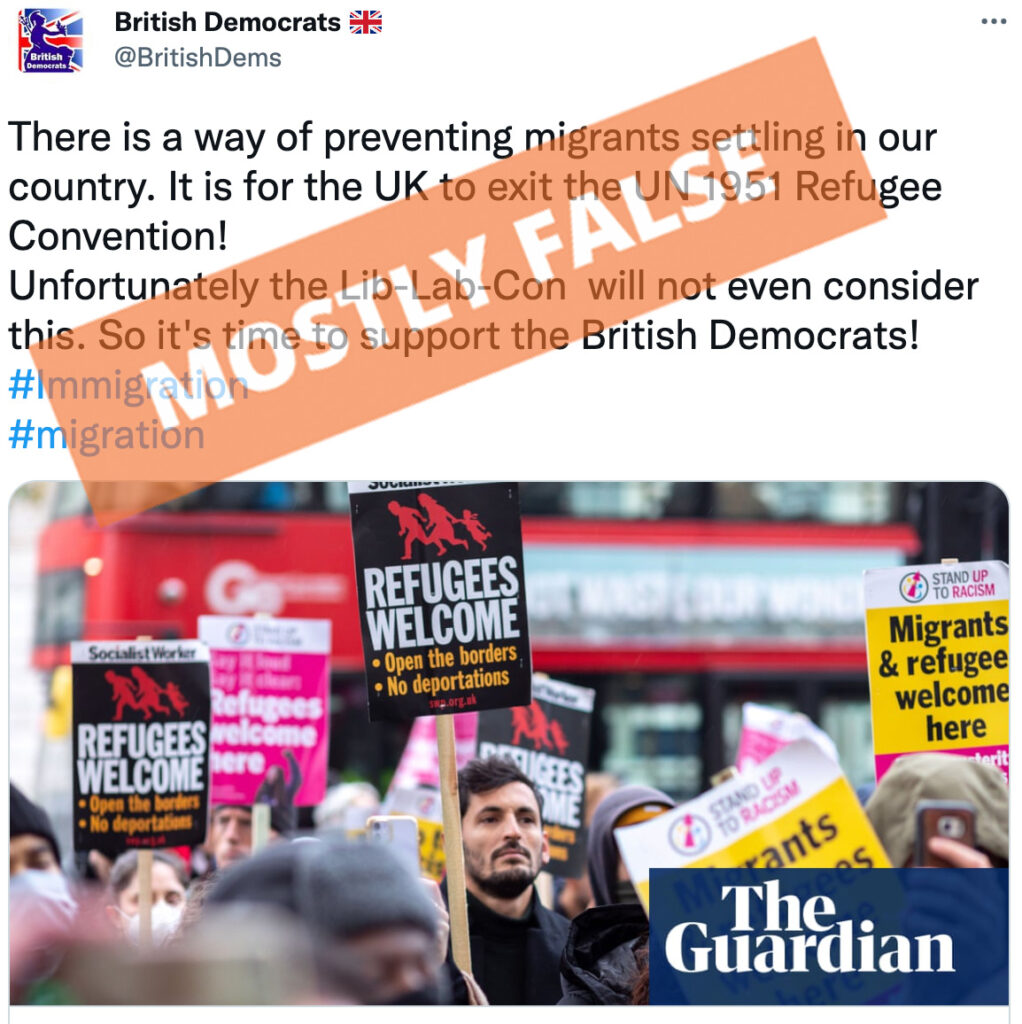On April 26th 2022, the British Democrats said that they want to withdraw from the UN 1951 Refugee Convention. This would make sure no more refugees would enter the UK. At least, that’s what they assert. Due to ‘the obligation of non-refoulment’, article 3 of the European Convention on Human Rights and the need for an agreement with the country where the refugees come from, this claim is mostly false.
The British Democrats are part of the British National Party. They are a far right-wing political party in the UK, known for their hard opinion on migration. Membership to this party is open only to people of “British or related European ethnicity.” In April, the British Democrats said on Twitter:
They claim that withdrawing from the UN 1951 Refugee Convention would stop migrants from settling in the United Kingdom. The British Democrats say that this is, in their opinion, sadly not even considered by the government.
What is the UN 1951 Refugee Convention?
In the aftermath of World War II, several countries wanted to have clear rules about migrants. In that way, they would have some insurance about safe migration in case another World War would happen. A Convention was written down in 1951 and later updated in the 1967 protocol. There are 145 countries that signed this Convention and have to follow strict rules when it comes to migration.
Many decades later, there is a massive migration problem in Europe. Many refugees come to Europe in small and unsafe boats. A lot of them try to get from Calais in France to the southeastern coast of the UK. That’s exactly what troubles the British Democrats and their voters. They don’t want any more migrants to settle in the UK.
Leaving the Convention: the ultimate solution?
Since the UK is also a part of the UN 1951 Refugee Convention, they cannot just stop accepting refugees in their country. So the proposal of the British Democrats is to withdraw from the Convention. But is that possible? It’s not a simple ‘yes’ or ‘no’.
Thinking rationally, a UK exit from the UN 1951 Refugee Convention will not happen. Professor in the department of Social Policy, Sociology and Criminology at the University of Birmingham, Nando Sigona, claims that a British exit from the Convention would put the UK in a very difficult position.
It’s not a very western thing to do as well. All the European countries are part of the UN 1951 Refugee Convention. “Even if the UK decides to leave the UN 1951 Refugee Convention, they cannot simply start to send refugees back. They need an agreement with the country where the refugees come from saying that that country will take the refugees back. Of course, such an arrangement is very unlikely, because that country doesn’t want their refugees back”, says Sigona.
What happens in other countries?
Since the vast majority of the countries are a part of the UN 1951 Refugee Convention and/or the 1967 protocol, it is hard to have a good idea about what could happen if the United Kingdom left the Convention.
However, there are some countries that are not a part of the UN 1951 Refugee Convention or the 1967 protocol. The most important ones being India, Saudi Arabia, Libya and Indonesia. Interestingly, almost all of the countries that are not a part of the Convention or protocol are situated in Asia. But what happens with migrants or refugees in these countries?
Every country has its own style when it comes to taking care of migrants. Mostly, these countries only grant asylum to migrants from a few neighboring countries with internal problems. For example: India does not have a national refugee protection framework but does grant asylum to refugees from Afghanistan and Myanmar. In Saudi Arabia, the whole concept of refugees is not even recognized by law. This means that refugees get imprisoned. After this prison time, Saudi Arabia deports its refugees.
Are there any other rules that ensure the safety of refugees in the UK?
There are apart from the UN 1951 Refugee Convention some other rules that make it more difficult to send refugees back. Professor in Migration Law at the University of Exeter, Helena Wray, explains: “The obligation of non-refoulment makes sure refugees cannot be sent back to a place where they face severe ill treatment. The obligation under article 3 of the European Convention on Human Rights not to subject anyone to torture or inhuman or degrading treatment is a second rule that makes it hard to send refugees back.” Wray continues: “Other human rights instruments are also relevant, but the problem is that it would be difficult for an individual to mobilize these rights, if the UK was determined to ignore them.”
Conclusion
Although it is very unlikely and extremely complicated, the UK could withdraw from the UN 1951 Convention. But, since almost all of the British political parties don’t want a withdrawal from this Convention, it would be very hard for the British Democrats to get them to exit. Even if they would succeed to do so, the UK would in some cases still have to accept some migrants because of the other rules concerning migration. The ‘obligation of non-refoulment’ and article 3 of the European Convention on Human Rights. But the main reason is the need for an agreement with the country where the refugees come from. Which hardly ever happens. So the claim that only the UN 1951 Convention can provide this is false.
RESEARCH | ARTICLE © Louise Deweerdt and Elias Feys, Artevelde University of Applied Sciences, Belgium
Leave your comments, thoughts and suggestions in the box below. Take note: your response is moderated.





